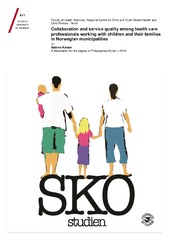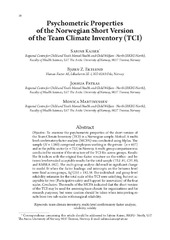| dc.contributor.advisor | Martinussen, Monica | |
| dc.contributor.author | Kaiser, Sabine | |
| dc.date.accessioned | 2019-04-25T11:02:07Z | |
| dc.date.available | 2019-04-25T11:02:07Z | |
| dc.date.issued | 2019-03-29 | |
| dc.description.abstract | The main objective of this thesis was to examine the importance of interprofessional collaboration and teamwork between different health care professionals on outcomes that are relevant for the professionals themselves but also for the organizations, and indirectly also for the users of the different services. Interprofessional collaboration and teamwork are an integral part of the work health and social care professionals do and can therefore be viewed as job resources for the professionals, which help them to conduct their work.
Four different studies, with different aims, participants, and methodology, were conducted to answer different parts of the overall research question. The first study was longitudinal and examined if a reorganization of services for children and their families to an integrated Child and Family Unit would lead to better collaboration between the services and increased service quality. The second study used cross-sectional data to examine if the short version of the Team Climate Inventory is a valid instrument to assess teamwork. The third study was cross-sectional and used the Job Demands-Resources Model to examine the relationship between different job demands and resources (e.g., interprofessional collaboration and teamwork) in relation to worker well-being and organizational outcomes. The fourth study was a meta-analysis synthesizing research about the relationship between interprofessional collaboration and teamwork and important outcomes such as worker well-being and organizational outcomes (e.g., service quality). | en_US |
| dc.description.doctoraltype | ph.d. | en_US |
| dc.description.popularabstract | There are many different professions and services that work with health in children, young people, and their families in municipalities in Norway. Poor collaboration between these various services and professions can be problematic. It can cause children not to get the help they need when they need it the most. On the other hand, collaboration and teamwork can also be viewed as job resources for the professionals that work in the different services. Job resources are characteristics of the job that support goal achievement and are motivating and increase learning.
The thesis aims at examining the importance of interprofessional collaboration and teamwork as job resources for professionals that work in health and social care services with a focus on professionals working in Family’s House or family centers in Norway. Four different studies, with different aims, participants, and methodology, were conducted to answer different parts of the research questions. As a whole the thesis examines possible influences of collaboration (such as co-location), its relationship to individual outcomes (such as worker well-being) and to organizational outcomes (such as service quality). | en_US |
| dc.description.sponsorship | The Regional Centre for Child and Youth Mental Health and Child Welfare - North at UiT The Arctic University of Norway in Tromsø and the Norwegian Directorate of Health. | en_US |
| dc.identifier.uri | https://hdl.handle.net/10037/15225 | |
| dc.language.iso | eng | en_US |
| dc.publisher | UiT The Arctic University of Norway | en_US |
| dc.publisher | UiT Norges arktiske universitet | en_US |
| dc.relation.haspart | <p>This thesis is based on the following papers:
<p>Paper I: Martinussen, M., Kaiser, S., Adolfsen, F., Patras, J. & Richardsen, A.M. (2017). Reorganisation of healthcare services for children and families: Improving collaboration, service quality, and worker well-being. <i>Journal of Interprofessional Care, 31</i>(4), 487-496. Publisher’s version not available in Munin due to publisher’s restrictions. Available at <a href=https://doi.org/10.1080/13561820.2017.1316249>https://doi.org/10.1080/13561820.2017.1316249</a>. Accepted manuscript version available at <a href=https://hdl.handle.net/10037/12864>https://hdl.handle.net/10037/12864</a>.
<p>Paper II: Kaiser, S., Patras, J. & Martinussen, M. (2016). Psychometric Properties of the Norwegian Short Version of the Team Climate Inventory (TCI). <i>Scandinavian Journal of Organizational Psychology, 8</i>(2), 18-28. Also available at <a href=https://hdl.handle.net/10037/15231>https://hdl.handle.net/10037/15231</a>.
<p>Paper III: Kaiser, S., Patras, J., Adolfsen, F., Richardsen, A., & Martinussen, M. (2018). Using the job demands-resources model to evaluate work-related outcomes among Norwegian health care workers. (Manuscript).
<p>Paper IV: Kaiser, S., Patras, J. & Martinussen, M. (2018). Linking interprofessional work to outcomes for employees: A meta‐analysis. <i>Research in Nursing and Health, 41</i>(3), 265-280. Available at <a href=https://doi.org/10.1002/nur.21858> https://doi.org/10.1002/nur.21858</a>. Accepted manuscript version available at <a href=https://hdl.handle.net/10037/14745>https://hdl.handle.net/10037/14745</a>. | en_US |
| dc.rights.accessRights | openAccess | en_US |
| dc.rights.holder | Copyright 2019 The Author(s) | |
| dc.rights.uri | https://creativecommons.org/licenses/by-nc-sa/3.0 | en_US |
| dc.rights | Attribution-NonCommercial-ShareAlike 3.0 Unported (CC BY-NC-SA 3.0) | en_US |
| dc.subject | VDP::Medisinske Fag: 700::Helsefag: 800::Helsetjeneste- og helseadministrasjonsforskning: 806 | en_US |
| dc.subject | VDP::Medical disciplines: 700::Health sciences: 800::Health service and health administration research: 806 | en_US |
| dc.title | Collaboration and service quality among health care professionals working with children and their families in Norwegian municipalities | en_US |
| dc.type | Doctoral thesis | en_US |
| dc.type | Doktorgradsavhandling | en_US |


 English
English norsk
norsk

